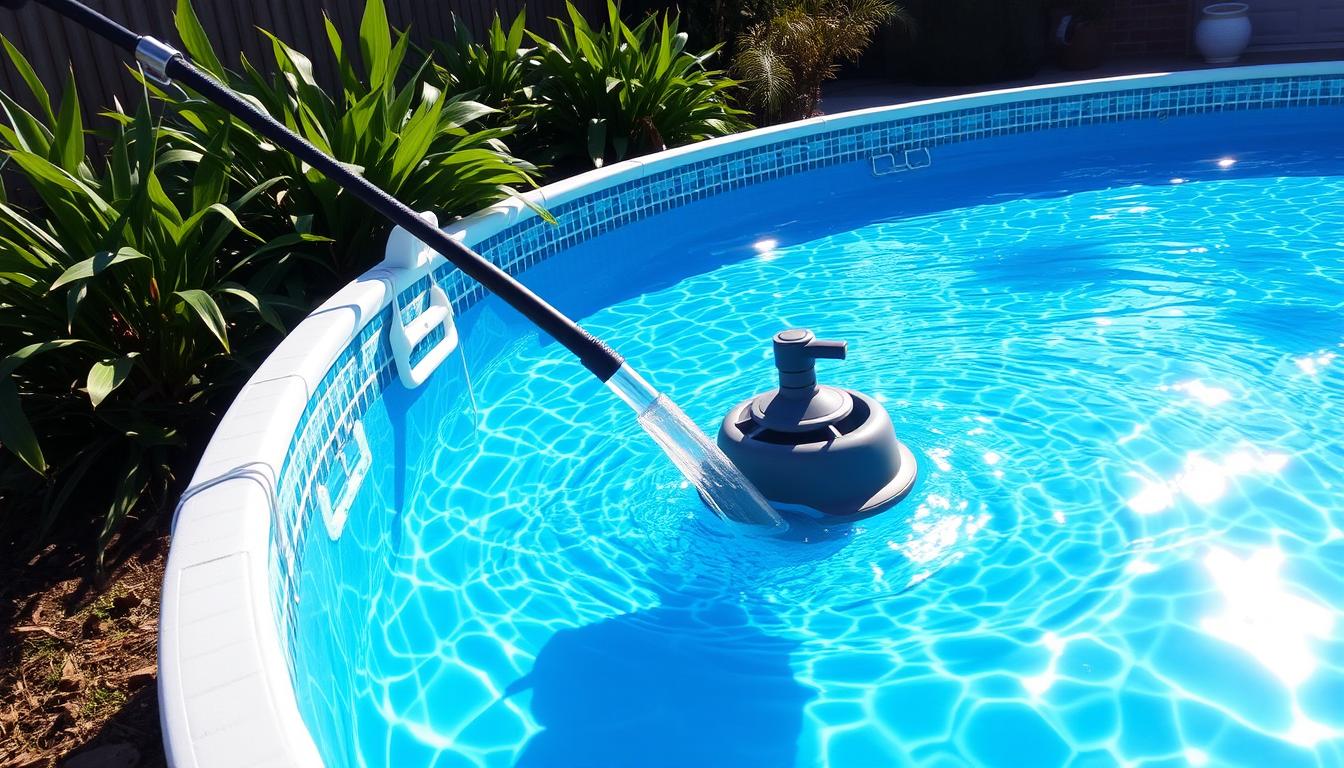
The pool filters market was valued at $4.5 Billion in 2023. It’s expected to grow 5.8% annually by 2032. This shows how important proper pool maintenance is. Vacuuming is key to keeping your above ground pool clean.
This guide will help you hook up your pool vacuum. We’ll cover different types of filters and cleaning systems. This information is useful for all pool owners.
It’s crucial to understand your pool’s filtration system. There are three main types: sand, cartridge, and diatomaceous earth (DE) filters. Sand filters catch particles as small as 20-40 microns. They’re cost-effective and easy to use.
Cartridge filters catch smaller particles than sand filters. They’re good for smaller pools with limited space. DE filters catch tiny particles, as small as 2-5 microns. They need monthly backwashing for maintenance.
Knowing your system helps you choose the best vacuuming method. It also ensures proper pool vacuum hose installation.
Test and adjust water chemistry 2-3 times per week. Skim debris daily and brush pool walls and floor weekly. Shock the pool water periodically to destroy contaminants and refresh chlorine levels.
Consistent care keeps above ground pools in top shape. This includes effective vacuuming using the right technique.
Key Takeaways
- Understand your pool’s filtration system (sand, cartridge, or DE filters) for effective pool vacuum setup
- Follow a step-by-step guide for easy pool vacuum connection and proper vacuuming technique
- Regularly test and adjust water chemistry, skim debris, and brush pool walls and floor
- Monitor filter pressure gauge and periodically shock pool water for optimal maintenance
- Consistent care and maintenance, including effective pool vacuuming, are crucial for a clean and healthy above ground pool
Understanding Your Pool’s Filtration System
A clean pool needs an efficient filtration system. This system is vital for removing debris and contaminants. Knowing the filter types for above ground pools helps you choose wisely.
Proper maintenance ensures your pool filter works well. Understanding different filters is key to keeping your pool clean and inviting.
Sand Filters: Trapping Debris with Sand
Sand filters are popular for residential pools. They’re cost-effective and easy to use. These filters trap particles as small as 20-40 microns.
For best results, watch the pressure gauge closely. Backwash when pressure is 8-10 PSI higher than normal.
Cartridge Filters: Pleated Material for Effective Filtration
Cartridge filters offer efficient filtration and high water clarity. They use a pleated cartridge to capture dirt and debris. These filters work well for smaller pools and tight spaces.
Regular cleaning or replacement of the cartridge is necessary. This prevents clogging and maintains effectiveness.
Diatomaceous Earth (DE) Filters: Fine Powder for Superior Cleaning
DE filters provide exceptional water quality. They use diatomaceous earth, a fine powder, to coat filter grids. These filters can catch particles as small as 2-5 microns.
DE filters need regular backwashing to clean the grids. Fresh DE powder must be added after cleaning.
Regular maintenance is key to keeping your pool filter functioning at its best. Be sure to follow the manufacturer’s guidelines for cleaning, backwashing, and replacing filter media.
| Filter Type | Filtration Efficiency | Maintenance |
|---|---|---|
| Sand Filters | Captures particles 20-40 microns | Backwash when pressure reads 8-10 PSI higher than normal |
| Cartridge Filters | Efficient filtration and high water clarity | Clean or replace cartridge periodically |
| DE Filters | Captures particles as small as 2-5 microns | Backwash and recharge with fresh DE regularly |
Picking the right filter depends on your pool size and budget. Consider your desired water quality too. Each filter type has its own benefits.
By understanding these filters, you can make a smart choice. This ensures your pool stays clean and enjoyable all season long.
Vacuuming Your Above Ground Pool: Simplified in 5 Steps
Keeping your above ground pool clean is easy with the right tools and methods. This guide covers manual and automatic pool cleaning techniques. Follow these steps to maintain a sparkling pool all season long.
Manual Vacuuming: Equipment Setup and Priming
Gather your vacuum head, telescopic pole, and hose. Attach the head to the pole and connect the hose. Submerge the vacuum head and fill the hose with water.
Remove all air to ensure proper suction. Connect the other hose end to your pool’s skimmer or vacuum point.
Connecting to the Filtration System and Vacuuming Technique
Turn on the pump after connecting the vacuum to your pool’s filtration system. Use long, slow strokes to vacuum the pool floor and walls. This method ensures thorough cleaning and efficient debris removal.
Check and empty the skimmer and pump baskets regularly. This maintains optimal suction power throughout the cleaning process.
Automatic Pool Cleaners: Robotic, Suction, and Pressure Options
Automatic pool cleaners offer a hands-off approach to pool maintenance. Robotic cleaners are self-contained units that work independently in the water. They collect debris in their internal filters.
Suction cleaners attach to your pool’s dedicated suction line or skimmer. Pressure cleaners connect to the return line and use water pressure to move.
Proper Setup and Monitoring for Efficient Cleaning
Follow the manufacturer’s instructions to connect your automatic cleaner to the filtration system. Monitor the cleaner’s progress and adjust as needed to cover all pool areas.
Check and empty the cleaner’s debris bag or canister regularly. This ensures consistent performance throughout the cleaning process.
Post-Use Maintenance and Storage Tips
After each use, disconnect the vacuum equipment from your pool’s filtration system. Rinse all equipment thoroughly with fresh water to remove chemicals and debris.
Allow the equipment to dry completely before storage. Store in a cool, dry place to prevent damage and ensure readiness for future use.







